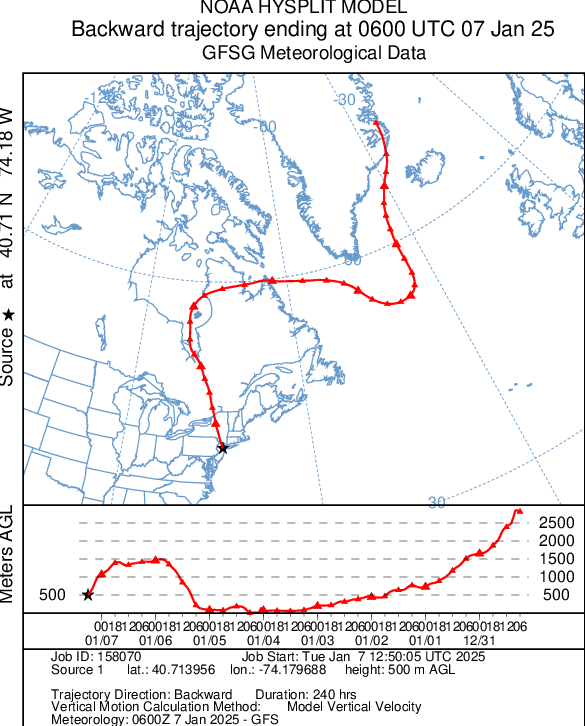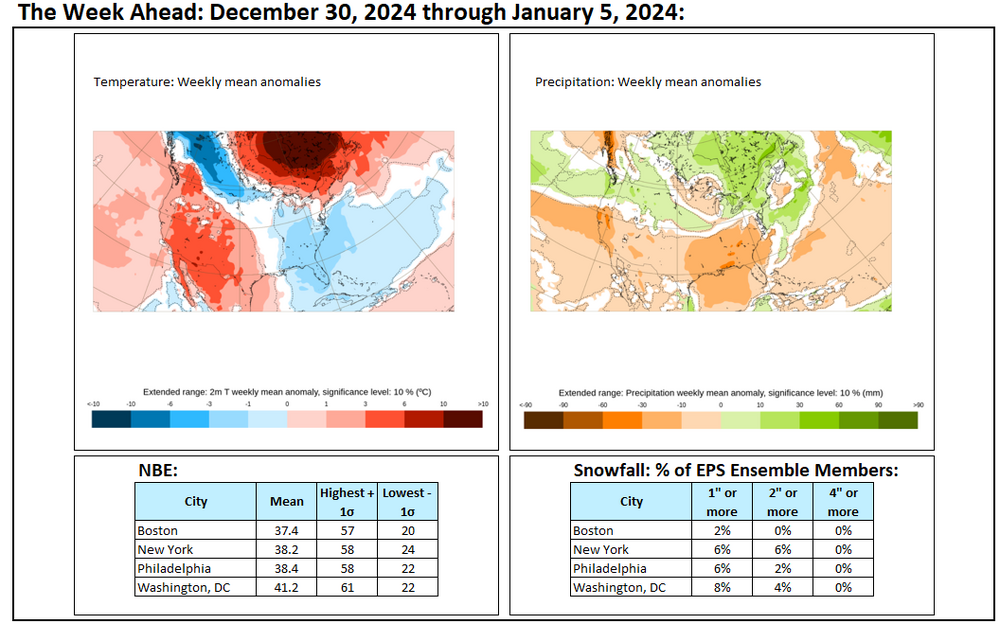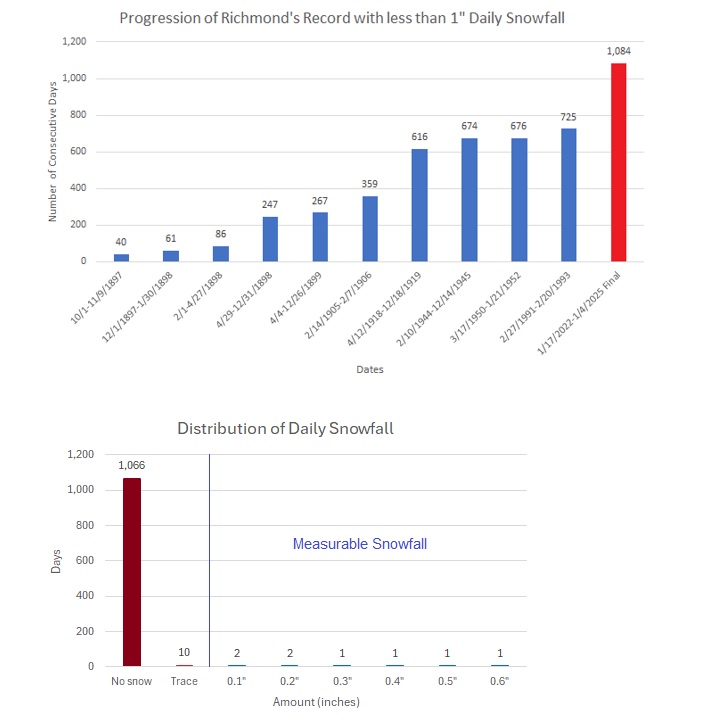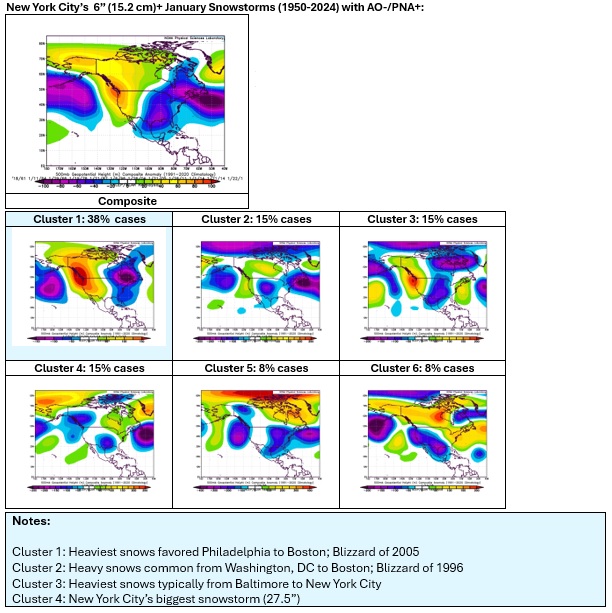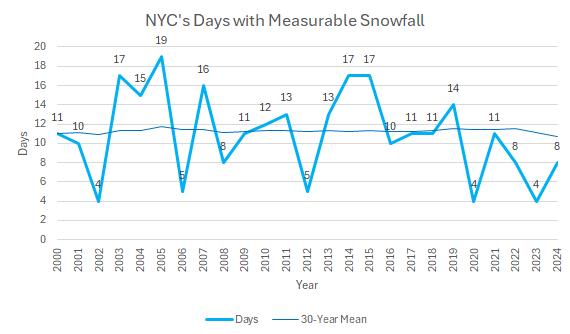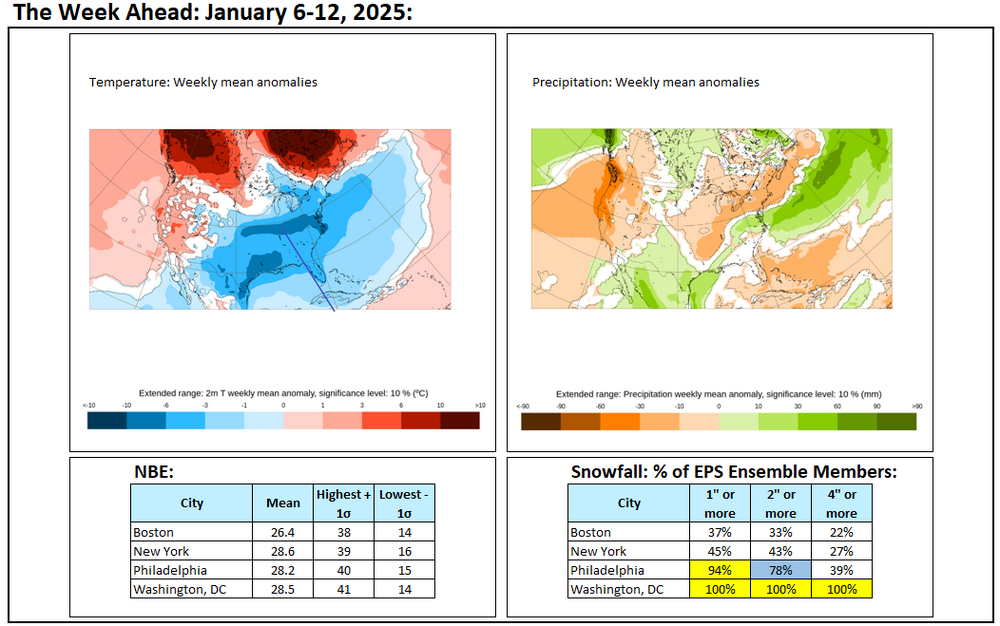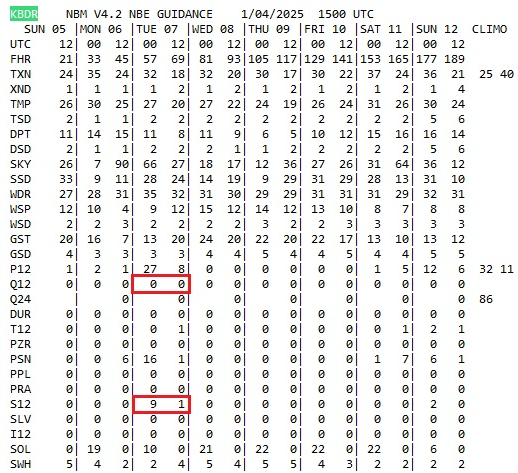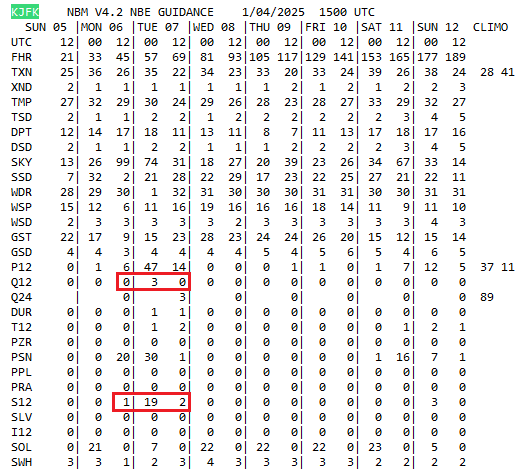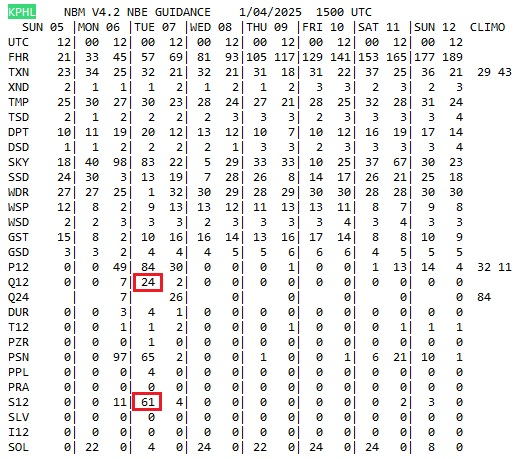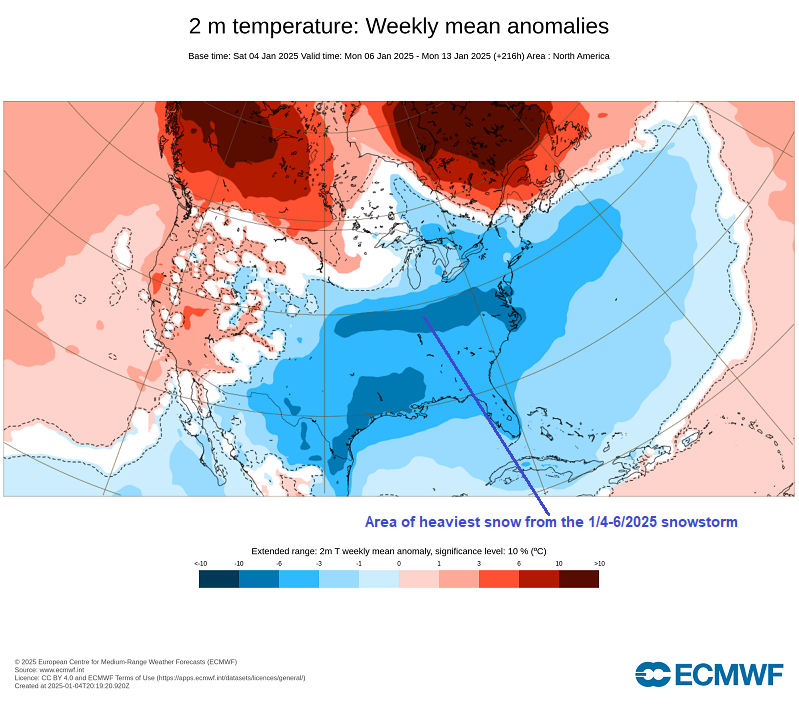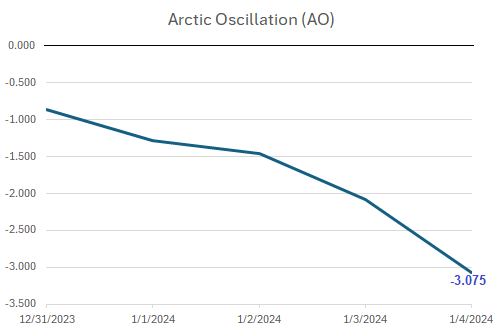-
Posts
22,900 -
Joined
Content Type
Profiles
Blogs
Forums
American Weather
Media Demo
Store
Gallery
Everything posted by donsutherland1
-
-
A significant snowstorm continues to bring light snow to parts of the Middle Atlantic region. Snowfall amounts so far, include: Baltimore: 5.8" Bridgeport: 0.4" Islip: 0.4" New York City: 0.9" Newark: 0.8" Philadelphia: 1.8" Richmond: 4.0" Washington, DC: 5.5" An extended period of generally below normal temperatures is underway in the New York City area. Although this cold regime will likely extend through at least mid-month, the kind of severe cold that produces minimum temperatures below 10° in the Philadelphia to New York City areas is unlikely during that period. The cold could still peak with readings dropping into the teens and several subfreezing highs. The second and third weeks of January will likely feature widespread cold anomalies in much of the eastern half of the CONUS and Canada south of the Hudson and James Bays. The potential exists for widespread cold anomalies of 6°-10° below normal during that week in parts of that region, particularly the Southeast. Those anomalies will likely result more from the prolonged nature of the cold than its severity. However, notable exceptions could be areas with fresh snow cover that experience strong radiational cooling. The ENSO Region 1+2 anomaly was +0.1°C and the Region 3.4 anomaly was -0.7°C for the week centered around January 1. For the past six weeks, the ENSO Region 1+2 anomaly has averaged +0.02°C and the ENSO Region 3.4 anomaly has averaged -0.63°C. Neutral ENSO conditions may still evolve into a La Niña event during the winter. Uncertainty as to whether a La Niña will actually develop persists. On the December 19 outlook, 56% of dynamical models but 0% of the statistical models forecast the development of a La Niña. The SOI was +5.33 today. The preliminary Arctic Oscillation (AO) was -3.752 today.
-

Snowfall NYC subforum Jan 6 and OBS if needed
donsutherland1 replied to wdrag's topic in New York City Metro
Final snowfall amounts: BDR: 0.4" EWR: 0.8" ISP: 0.4" JFK: 0.5" LGA: 0.5" NYC: 0.9" -
-

Snowfall NYC subforum Jan 6 and OBS if needed
donsutherland1 replied to wdrag's topic in New York City Metro
Flurries in the Bronx. -
With 4.0” snowfall yesterday, Richmond’s dreadful 1,084-day string without 1” or more daily snowfall finally ended.
-
The far more active subtropical jet during El Niño events facilitates the development of Miller A storms. During La Niña's the subtropical jet is less impactful and often quiet. It's a non-factor with the current storm. Phased solutions and Miller B transitions are more challenging dynamically.
-
There is a slowly building body of literature suggesting that CC impacts the North Pacific Jet. At present, the literature does not appear to rule out favorable winter configurations, but there is a shorter winter-season jet and earlier transition to spring/summer states. Over the long-term, there will likely be a structural decline in seasonal snowfall from warming, as has occurred from DCA southward. However, there will still be a lot of interannual and intraseasonal variability, so opportunities for big snowstorms and snowy seasons will still exist for the forseeable future.
-
Here are some clusters that provide insight into patterns that can deliver a significant snowfall to NYC:
-
An extended period of generally below normal temperatures is underway in the New York City area. Although this cold regime will likely extend through at least mid-month, the kind of severe cold that produces minimum temperatures below 10° in the Philadelphia to New York City areas is unlikely during that period. The cold could still peak with readings dropping into the teens and several subfreezing highs. A storm will bring parts of the Middle Atlantic region a moderate to locally significant snowfall tonight into tomorrow. Parts of the region will see 4"-8" of snow with locally higher amounts. The focus of the heaviest snows favors the Washington-Baltimore-Annapolis areas. Only minor adjustments were made to the estimated snowfall totals, as the block and confluence have been well-modeled for several days. Final snowfall estimates: Atlantic City: 4"-8" Baltimore: 4"-8" Islip: 0.5" or less (possibly no measurable snow) New York City: 0.5" or less (possibly no measurable snow) Newark: 0.5" or less Philadelphia: 2"-4" Richmond: 1"-3" Washington, DC: 4"-8" This kind of limited focus storm is far more common than storms that bring an extensive significant snowfall from Richmond to Boston. Since 1895, 429 storms have brought 6" or more snowfall to at least one of the following cities: Baltimore, Boston, New York, Philadelphia, Richmond, or Washington, DC. Just 11 (2.6%) brought 6" or more snow to all six of those cities. In terms of even larger snowfalls, just three (0.7%) legendary storms brought 10" or more snowfall to each of those cities: February 11-14, 1899, February 10-12, 1983, and January 6-8, 1996. The second and third weeks of January will likely feature widespread cold anomalies in much of the eastern half of the CONUS and Canada south of the Hudson and James Bays. The potential exists for widespread cold anomalies of 6°-10° below normal during that week in parts of that region, particularly the Southeast. Those anomalies will likely result more from the prolonged nature of the cold than its severity. However, notable exceptions could be areas with fresh snow cover that experience strong radiational cooling. The ENSO Region 1+2 anomaly was -0.2°C and the Region 3.4 anomaly was -1.1°C for the week centered around December 25. For the past six weeks, the ENSO Region 1+2 anomaly has averaged +0.10°C and the ENSO Region 3.4 anomaly has averaged -0.53°C. Neutral ENSO conditions may still evolve into a La Niña event during the winter. Uncertainty as to whether a La Niña will actually develop persists. On the December 19 outlook, 56% of dynamical models but 0% of the statistical models forecast the development of a La Niña. The SOI was +5.80 today. The preliminary Arctic Oscillation (AO) was -3.577 today.
-
The current 500 mb pattern is a good one for the Middle Atlantic region (Washington, DC). It is not consistent with patterns for significant snowfalls for NYC and northward. Patterns conducive to widespread big snows from DCA to BOS are much less uncommon. Overall, the pattern is producing a significant event, just not for the NYC/PHL area.
-
AO+ greatly limits the risk of NYC January snowstorms. There are a few exceptions. AO values of -3 or below are typically too suppressive.
-

Snowfall NYC subforum Jan 6 and OBS if needed
donsutherland1 replied to wdrag's topic in New York City Metro
I enjoy every day with measurable snowfall. Such days are, in fact, not very common (30-year average for NYC has fluctuated from 10.7 to 11.7 since 2000). Such days are precious. -
-
Some mixing would be plausible for sure.
-
I disagree. A reasonable worst-case would entail a rain/freezing rain/sleet and snow event. Since 1950, New York City saw five measurable precipitation cases in January under the following criteria (which would apply for January 11th based on the latest guidance and today's AO value): - Negative AO (-2.000 to -0.001) - PNA > 0 - NAO -0.25 or below - Minimum AO value 7 or fewer days prior to the event: -3.000 or below Four of the five (80%) measurable precipitation events also had measurable snow. Two (40%) were all snow events. Four (80%) had temperatures that spent time in the 20s or teens. Only a single event with 0.05" precipitation saw no snow.
-

Snowfall NYC subforum Jan 6 and OBS if needed
donsutherland1 replied to wdrag's topic in New York City Metro
The head of the NBM development team has replied. Several points: 1. The team is aware of the issue 2. NBM inputs for QPF and snow differ. It is implied that this may be resulting in the observed issue 3. The team will seek to align the QPF and snow inputs in v5.0, which will be released sometime next year The exact reply is below: "We are aware of this issue and are attempting to align the NBM qpf inputs with those used for snow for NBM v5.0 which is scheduled to come out sometime next year. It is likely we will cut down on some of the qpf inputs in order to make this happen." For those looking for a preview of v5.0, the last paragraph of this press release offers a short description: https://vlab.noaa.gov/web/mdl/-/nbm-upgraded-to-version-4-2?redirect=%2Fweb%2Fmdl%2Fevents -
An extended period of generally below normal temperatures has now commenced in the New York City area. Although the general below normal temperature regime will likely extend through at least mid-month, it appears increasingly likely that there won't be the kind of severe cold that sees minimum temperatures fall below 10° in the Philadelphia to New York City areas during that period. The cold could still peak with readings dropping into the teens and several subfreezing highs. A storm will bring parts of the Middle Atlantic region a moderate to locally significant snowfall tomorrow night into Monday. Parts of the region will see 4"-8" of snow with locally higher amounts. Initial snowfall estimates: Atlantic City: 3"-6" Baltimore: 4"-8" Islip: 0.5" or less (possibly no measurable snow) New York City: 0.5" or less (possibly no measurable snow) Newark: 1" or less (possibly no measurable snow) Philadelphia: 3"-5" Richmond: 1"-3" Washington, DC: 4"-8" Small changes in the models may still occur in coming cycles. The 12z UKMET that limits the northern extent of the heavy snowfall to central Virginia and 18z NAM that centers it just south of the Mason-Dixon Line are outliers. Those models probably offer worst-case scenarios. Big model changes remain unlikely as the AO block that will influence the storm's track and confluence to its north is well-modeled. The focus of the heaviest snows still appears to favor the Washington-Baltimore-Annapolis areas. The second and third weeks of January will likely feature widespread cold anomalies in much of the eastern half of the CONUS and Canada south of the Hudson and James Bays. The potential exists for widespread cold anomalies of 6°-10° below normal during that week in parts of that region, particularly the Southeast. Those anomalies will likely result more from the prolonged nature of the cold than its severity. However, notable exceptions could be areas with fresh snow cover that experience strong radiational cooling. The ENSO Region 1+2 anomaly was -0.2°C and the Region 3.4 anomaly was -1.1°C for the week centered around December 25. For the past six weeks, the ENSO Region 1+2 anomaly has averaged +0.10°C and the ENSO Region 3.4 anomaly has averaged -0.53°C. Neutral ENSO conditions may still evolve into a La Niña event during the winter. Uncertainty as to whether a La Niña will actually develop persists. On the December 19 outlook, 56% of dynamical models but 0% of the statistical models forecast the development of a La Niña. The SOI was -0.23 today. The preliminary Arctic Oscillation (AO) was -3.075 today.
-

Snowfall NYC subforum Jan 6 and OBS if needed
donsutherland1 replied to wdrag's topic in New York City Metro
As previously noted in this thread, I had pointed out that there were cases where NBE was showing snowfall amounts with 0 qpf and unrealistic snow-liquid ratios e.g., 95:1 for NYC, issues that did not occur with the prior version (4.1). I also saw that there were areas where qpf was present, but ratios were still unrealistic. That raises questions about not just the periphery of the storm where a degree of smoothing might have been involved, but all the storm totals. On account of concluding that all storm totals could be compromised, I decided to contact the development team. I suspect that the issue is common to your discussion, Drag's discussion, and my discussion. -
-
I believe the -16 occurred in 1780, not 1783.
-
Early January 1835 saw an extremely cold air mass invade the eastern U.S. The air mass was largely unmodified Arctic air. On January 4th, the temperature bottomed out at -23° in New Haven. The January 6, 1835 issue of the New York Mercantile Advertiser wrote: We have never known ice [to] accumulate in our harbor more rapidly than it has done since Saturday evening [evening of January 3]. The North River [Hudson River] was covered yesterday nearly down to the Battery, and there being but little wind, the ice remained stationary, and requires but a short time more of severe weather to give us a solid bridge to Jersey City and Hoboken. In the East riverr, the ice was moved by the tide, and left occasional openings for the ferry boats. At one o’clock the river was completely blocked with ice for a short time, above the Fulton St. ferry, so that several persons crossed upon it to and from Brooklyn. Large fields of ice in the upper and lower bays drifting with the tide, occasionally block up the Narrows, and render it difficult for vessels to get into port without the aid of steamboats. The January 9, 1835 edition of Charleston, SC's The Southern Patriot described conditions in Savannah as follows: The cold which visited us on Sunday has not left us, and icicles are still pendant from trees and roofs, aided by the unusual appearance of snow on the ground. On Monday morning one might have thought that he was in Canada, not Georgia, as everything wore one uniform white Livery. At the time we are writing, snow is still lying in those places secluded from the sun.
-

Snowfall NYC subforum Jan 6 and OBS if needed
donsutherland1 replied to wdrag's topic in New York City Metro
FYI, regarding the National Blend of Models issue: I emailed the development team this morning with screen shots. I used the text from the guidance rather than vendor maps to illustrate that the issue exists with the product itself. The three screenshots I included are below. I will post any updates I receive from the development team. -
The map shows where the current air mass originated. It originated in Canada's Northwest Territories. The lack of cross-polar flow has limited the magnitude of the cold. It's now colder than normal but really not exceptional. Cross-polar flow often leads to severe Arctic outbreaks in the CONUS.
-
The 1/4 AO value came in at -3.075. The AO continues to fall quite rapidly. The current value is the lowest of the winter so far. A further decline is forecast on the ensembles.


